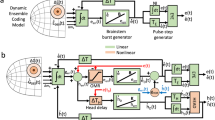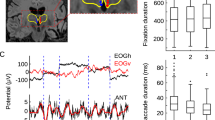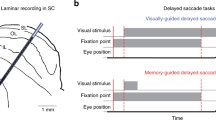Abstract
The superior colliculus (SC) is thought to use a set of superimposed, topographically organized neural maps of visual, auditory, somatosensory and motor space to direct the eyes toward novel stimuli1,2. Auditory spatial response fields (SRFs) of SC neurons may change when an animal moves its eyes, presumably to compensate for the resulting misalignment of visual and auditory sensory spatial reference frames3,4,5,6, but the mechanisms responsible for these SRF changes remain unknown. Here we report that passive deviation of the eye in anesthetized, paralyzed animals can profoundly affect the auditory responsiveness of SC neurons, but seems insufficient by itself to provide adaptive shifts of auditory SRFs.
This is a preview of subscription content, access via your institution
Access options
Subscribe to this journal
Receive 12 print issues and online access
$209.00 per year
only $17.42 per issue
Buy this article
- Purchase on Springer Link
- Instant access to full article PDF
Prices may be subject to local taxes which are calculated during checkout



Similar content being viewed by others
References
Jay, M. F. & Sparks, D. L. J. Neurophysiol. 57, 22–34 (1987).
Stein, B. E. & Meredith, M. A. (MIT Press, Cambridge, 1993).
Jay, M. F. & Sparks, D. L. Nature 309, 345–347 (1984).
Jay, M. F. & Sparks, D. L. J. Neurophysiol. 57, 35–55 (1987).
Peck, C. K., Baro, J. A. & Warder, S. M. Exp. Brain Res. 103, 227–242 (1995).
Hartline, P. H., Pandey Vimal, R. L., King, A. J., Kurylo, D. D. & Northmore, D. P. M. Exp. Brain. Res. 104, 402–408 (1995).
Groh, J. M., Trause, A. S., Underhill, A. M., Clark, K. R. & Inati, S. Neuron 29, 509–518 (2001).
Abrahams, V. C. Prog. Brain. Res. 50, 325–334 (1979).
Nelson, J. S., Meredith, M. A. & Stein, B. E. J. Neurophysiol. 62, 1360–1374 (1989).
Quaia, C., Lefevre, P. & Optican, L. M. J. Neurophysiol. 82, 999–1018 (1999).
Guthrie, B. L., Porter, J. D. & Sparks, D. L. Science 221, 1193–1195 (1983).
Brugge, J. F., Reale, R. A. & Hind, J. E. J. Neurosci. 16, 4420–4437 (1996).
Middlebrooks, J. C. & Knudsen, E. I. J. Neurosci. 4, 2621–2634 (1984).
King, A. J. & Hutchings, M. E. J. Neurophysiol. 57, 596–624 (1987).
Acknowledgements
Supported by NIH grants DC00116 and HD03352 and a Defeating Deafness/Dunhill Research Fellowship to J.W.H.S.
Author information
Authors and Affiliations
Corresponding author
Supplementary information
Rights and permissions
About this article
Cite this article
Zella, J., Brugge, J. & Schnupp, J. Passive eye displacement alters auditory spatial receptive fields of cat superior colliculus neurons. Nat Neurosci 4, 1167–1169 (2001). https://doi.org/10.1038/nn773
Received:
Accepted:
Published:
Issue Date:
DOI: https://doi.org/10.1038/nn773



